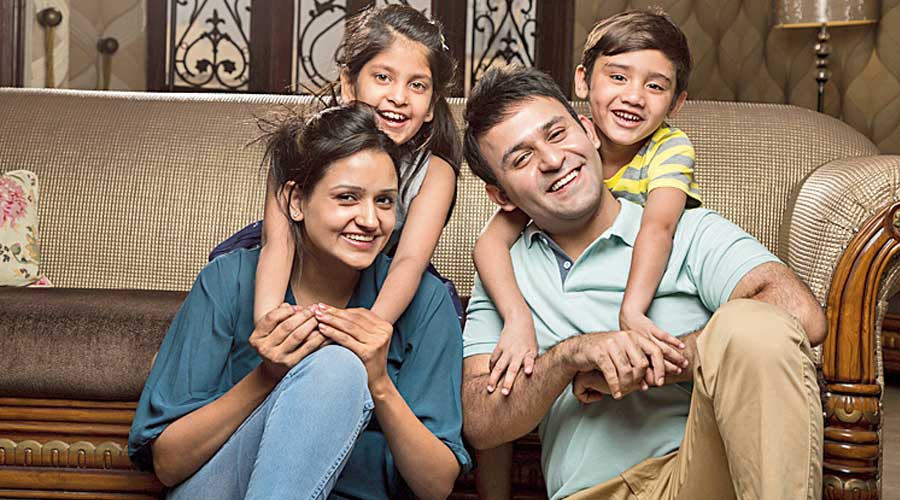New blend
Sir — Remarriage in India, where the divorce rate is only about one per cent, is still frowned upon. The situation is further complicated when children are thrown into the mix — the prefix, ‘step’, before a relation can seem ominous. But as more people refuse to stay in loveless or abusive marriages, the frequency of blended unions — where one or both spouses have children from a previous marriage — is steadily on the rise. The bonding of two such families need not be complicated. Reflection, love, respect and patience can help build bridges and foster new bonds. The extended family, too, can smoothen the process. The modern Indian family can take many forms.
Paramita Sarkar,
Calcutta
Right decision
Sir — The Supreme Court has set aside the bail granted to the prime accused in the Lakhimpur Kheri violence, Ashis Mishra (“SC sets aside minister son’s ‘myopic’ bail”, April 19). Several people died after being hit by a vehicle while protesting against the Centre’s farm laws. The Supreme Court has observed that the Allahabad High Court had provided relief to Mishra in a “tearing hurry” and on the basis of “irrelevant consideration”.
The father of the accused, Ajay Mishra Teni, the Union minister of state for home affairs, should have resigned from his position. Teni should learn from the actions of the veteran Bharatiya Janata Party leader, L.K. Advani, who had resigned from Lok Sabha when his name cropped up in the Hawala scandal. The BJP should remove Teni from the post.
Yash Pal Ralhan,
Jalandhar
Sir — A Supreme Court bench headed by the Chief Justice of India, N.V. Ramana, has cancelled the bail granted to Ashis Mishra. It is true that the victims’ families have the right to participate in the proceedings at every stage. The apex court’s decision must be lauded.
Meenal Baruah,
Dibrugarh
Try again
Sir — Newly-sworn in prime ministers of Pakistan begin their tenure by proclaiming that Pakistan intends to resolve its troubles with India. Shehbaz Sharif, too, has written to the prime minister of India, Narendra Modi, that he hopes for “peaceful and cooperative ties” between the two nations (“Good news”, April 19). Earlier, Modi had congratulated Sharif on his appointment. This may seem encouraging but such displays of cooperation usually tend to fizzle out. Sharif’s predecessor, Imran Khan, had inaugurated the Kartarpur Corridor with similar intentions. Hopefully, Sharif will be able to bring about meaningful change.
K. Nehru Patnaik,
Visakhapatnam
Myopic vision
Sir — The oft-repeated claim that a shared language, specifically Hindi, will unify the nation is misleading (“Shared essence”, April 15). The variety of languages spoken in different areas of North India are considered by many as dialects of Hindi. But it is clear from the ongoing agitations for recognizing languages like Magadhi, Bhojpuri and others that they cannot be subsumed under Hindi.
The growing administrative push for Hindi has led to uproar from different parts of the country. Furthermore, technical education in Hindi will lead to problems as there are a number of terms and concepts that cannot be translated into regional languages. The government should recognize that it is the diversity of languages that has made India a culturally rich nation.
H.N. Ramakrishna,
Bangalore
Glorious past
Sir — The prime minister, Narendra Modi, recently unveiled the Pradhanmantri Sangrahalaya in New Delhi. The museum, dedicated to all prime ministers of the nation, is home to the spinning wheel of Lal Bahadur Shastri, the spectacles of P.V. Narasimha Rao, the diaries of Chaudhary Charan Singh, and many other articles of note.
The origins of India’s prime ministers are as varied as they can be. The humble beginnings of some of these great individuals can provide motivation to the youth of the country and encourage them to dream big. The Centre must preserve the nation’s past through the construction of museums — like the upcoming museum which aims to commemorate tribal freedom fighters — and maintain sites of historical significance, such as the Jallianwala Bagh or Panchteerth, honouring the contributions of B.R. Ambedkar.
Nirmala Chouhan,
Ujjain
Sir — World Heritage Day, which is celebrated on April 18, is an occasion for us to remember that we must preserve our cultural heritage for future generations. Heritage sites are repositories of history and it is the duty of every individual to ensure their safety.
T.S. Karthik,
Chennai
Still rare
Sir — The editorial, “Pocket peeve” (April 17), rightly highlighted the fact that women’s attire exposes another aspect of patriarchy. Women have traditionally — and erroneously — been considered homemakers who primarily stay indoors. Their clothing has been designed to make them look attractive instead of being functional. In fact, even a few decades back, it was assumed that women do not need pockets in their clothes as they are dependent on males who are accompanying them outside for their expenses.
Modern, independent women need pockets to carry their belongings. This has led to an increase in demand for pockets in dresses. But it seems that society is still stuck to archaic notions about women’s clothing. None has the right to dictate what women should or should not wear.
Kiran Agarwal,
Calcutta










